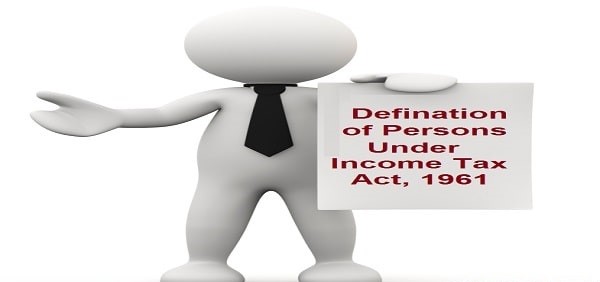Under Section 2 (31), ‘Person’ is an AOP or Association of Persons or BOI (Body of Individuals) or a Local Authority or an artificial judicial person, or not, that Person or Body or Authorities or a Legal Person, was established or merged for revenue, profit or gains. In this article, we will the definition of persons under Income Tax Act, 1961.

Definition of Persons under Income Tax Act, 1961
In terms of section 2 (31) of the Income-tax Act a person includes:
- Individuals
- Partnership Firms
- HUF
- Company
- An individual organization or body of persons whether incorporated or not.
- Local authorities
- Any other legal person who is not subject to any of the above clauses
The assessee is the person responsible for paying any taxes and any other fees specified under the law.
In the above section, it can be noted that man includes not only a natural person but also a person of the artificial judicial person. The types of people mentioned under the categories are described below.
- Individuals: Individuals refer to natural persons whether male or female or transgender, minor or major, resident or non-resident
- A partnership firm is a contractual relationship between two or more; persons who have agreed to conduct business on behalf of all or any of them on behalf of all to share the profits made by the business. LLP is also considered to be a corporation under the Income-tax act of 1961.
- HUF: Hindu Undivided Family (HUF) is a family business covered by Hindu law rules that include all people in a lineage from the same family as Karta and members as coparceners. Jain and Sikh families are also considered HUF under this act.
- Company: A company is a legal entity established under the Companies Act, 2013 or any other previous act. Companies include Any Indian Company Foreign Company Parent, Partner or Subsidiary Legal Company Public Company, any other type of company,
- An association or individual body: A group of people means a group of people united to achieve the same goal by operating the same principle. AOP members can be natural persons or judges.
- Local authorities: Local authorities are a legally responsible organization of public services designed to provide services in a particular area.
Every Assessee is a Person but every person is not an assessee
It is very important. An assessee is a person who is responsible for paying taxes, either on his or her income or with others. But that does not mean that everyone should pay taxes.
If you are an individual and your total income is below the income limit as per income tax, then you have no obligation to pay taxes.
If your income is not available then you are not responsible for remittances and refunds. If so, you are not an assessee but he is a person.
FAQs
Q: How does the Income Tax Act, 1961 define the term "person"?
The term “person” under the Income Tax Act, 1961, includes individuals, Hindu Undivided Families (HUFs), companies, firms, associations of persons (AOPs), body of individuals (BOIs), and any other entity capable of being taxed.
Q: Are individuals the only entities considered as persons under the Income Tax Act?
No, individuals are just one category of persons. The Act also recognizes other entities such as HUFs, companies, firms, AOPs, BOIs, etc., as persons for taxation purposes.
Q: What is the significance of including HUFs in the definition of persons?
Hindu Undivided Family (HUF) is a unique concept in Indian taxation where the family, as a unit, is considered a separate entity for tax purposes. HUFs have their own PAN (Permanent Account Number) and are subject to tax on their income.
Practice area's of B K Goyal & Co LLP
Income Tax Return Filing | Income Tax Appeal | Income Tax Notice | GST Registration | GST Return Filing | FSSAI Registration | Company Registration | Company Audit | Company Annual Compliance | Income Tax Audit | Nidhi Company Registration| LLP Registration | Accounting in India | NGO Registration | NGO Audit | ESG | BRSR | Private Security Agency | Udyam Registration | Trademark Registration | Copyright Registration | Patent Registration | Import Export Code | Forensic Accounting and Fraud Detection | Section 8 Company | Foreign Company | 80G and 12A Certificate | FCRA Registration |DGGI Cases | Scrutiny Cases | Income Escapement Cases | Search & Seizure | CIT Appeal | ITAT Appeal | Auditors | Internal Audit | Financial Audit | Process Audit | IEC Code | CA Certification | Income Tax Penalty Notice u/s 271(1)(c) | Income Tax Notice u/s 142(1) | Income Tax Notice u/s 144 |Income Tax Notice u/s 148 | Income Tax Demand Notice | Psara License | FCRA Online
Company Registration Services in major cities of India
Company Registration in Jaipur | Company Registration in Delhi | Company Registration in Pune | Company Registration in Hyderabad | Company Registration in Bangalore | Company Registration in Chennai | Company Registration in Kolkata | Company Registration in Mumbai | Company Registration in India | Company Registration in Gurgaon | Company Registration in Noida
